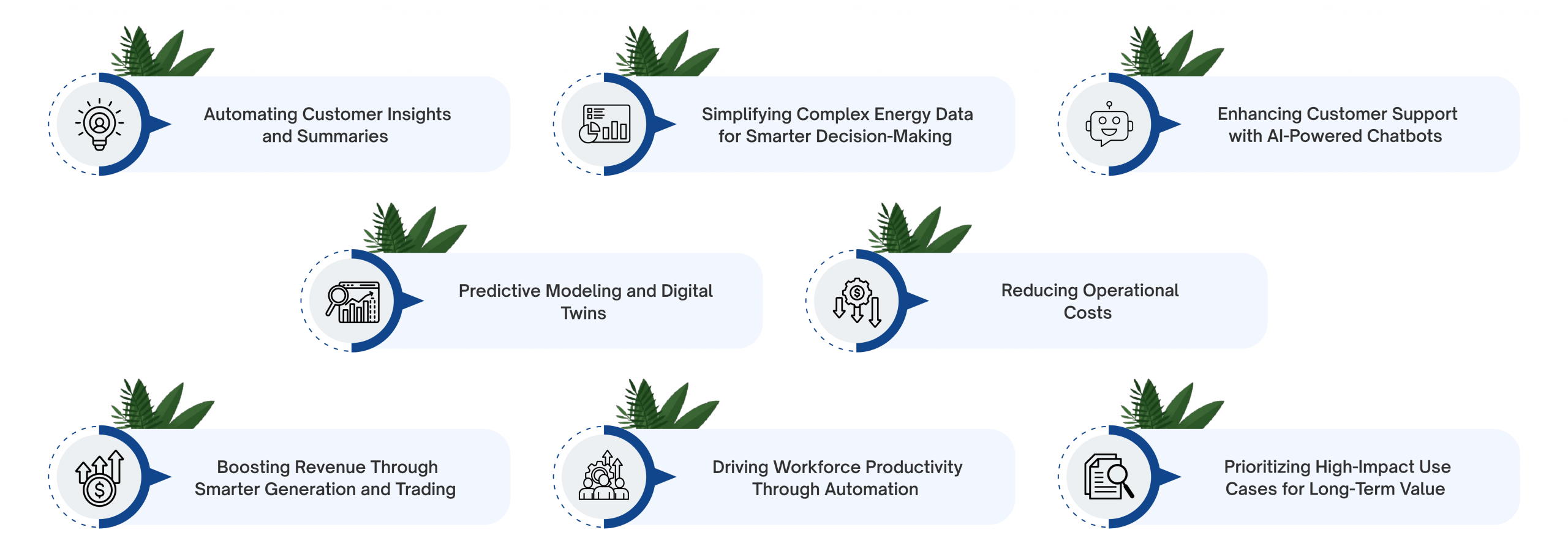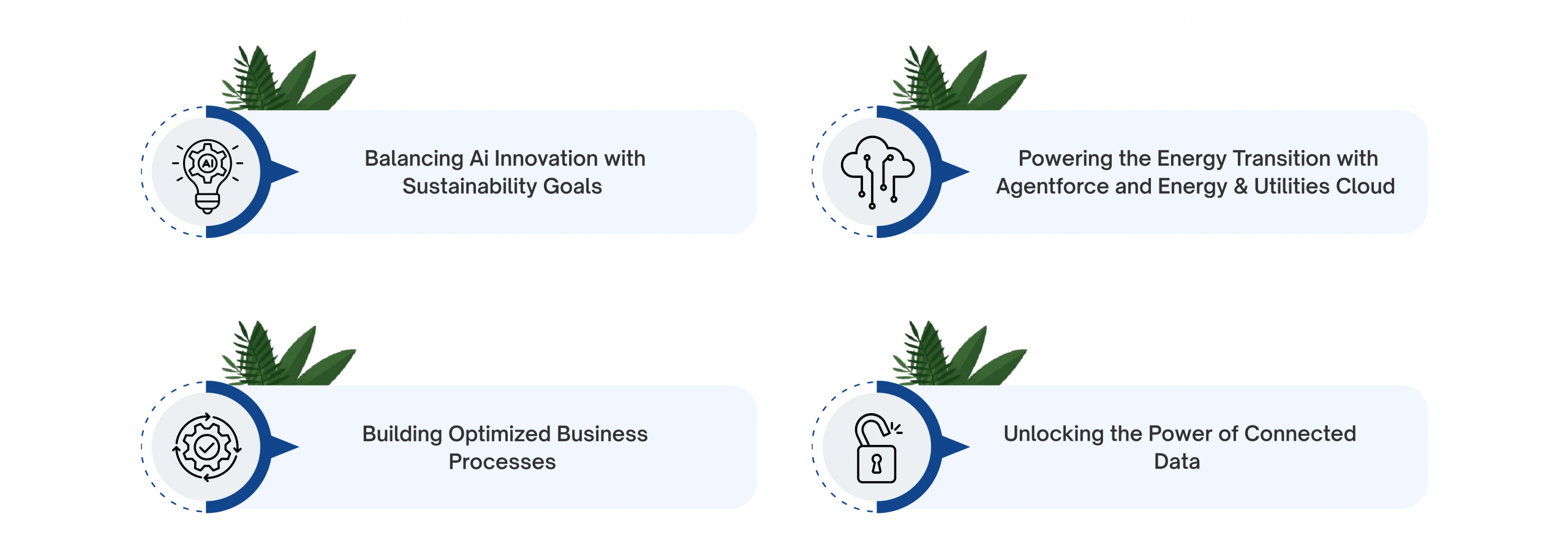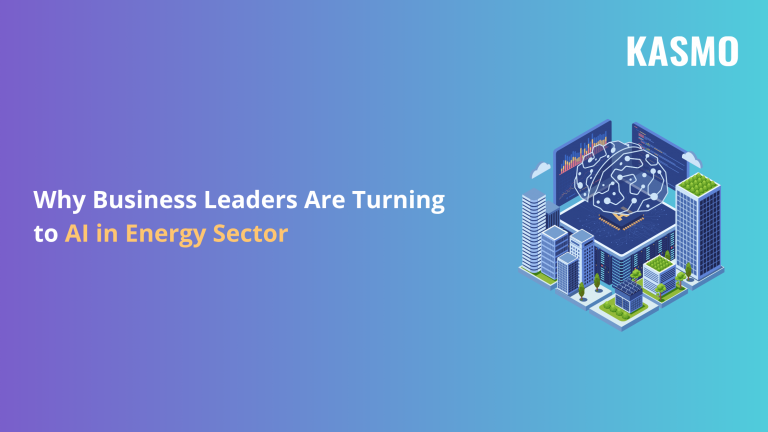Importance of Leveraging Generative AI in Energy Sector

Source: IBM
Leveraging Gen AI in energy sector is becoming crucial for business leaders who are opting to create more sustainable practices in their business operations. Traditional predictive models that track usage patterns and peak‑demand windows have already cut costs and improved reliability, yet they only scratch the surface of what’s possible in the energy industry. Gen AI-powered systems can ingest huge volumes of structured data, maintenance logs, and other operational data, which creates better business insights for industry leaders and helps them make strategic decisions.
Gen AI-powered systems help energy enterprises utilize this data to enhance customer engagement and spending. Recognizing the right moment to deploy AI-powered tools is vital. Some AI applications in the energy sector still benefit from lighter predictive techniques, especially when teams lack the deep operational context that advanced models demand.
As data volumes increase and energy enterprises move towards reducing their carbon footprint, generative AI will be able to overcome challenges and will have greater agility to address persistent renewable energy problems.
Applications of Gen AI in Energy Sector
As the demand for smarter, cleaner, and more efficient energy systems grows, integration of generative AI in energy sector is becoming essential. Let’s understand how gen AI is transforming operations in energy companies:

Automating Customer Insights and Summaries
When energy companies integrate AI with their operations, they get real-time summaries which help them make strategic decisions. As AI can be used to consolidate data from different sources, CRM systems and third-party sources, energy providers can use generative AI to identify usage patterns, preferences, and market trends. These summaries help enterprises create targeted strategies to improve customer satisfaction, enhance personalization, and enable accurate demand forecasting.
Simplifying Complex Energy Data for Smarter Decision-Making
Generative AI also plays a key role in making data more digestible. It processes inputs from smart meters, usage logs, and various monitoring systems, transforming them into energy-saving recommendations tailored to individual users. This not only empowers customers to make informed decisions but also helps business leaders design more efficient and responsive services.
Enhancing Customer Support with AI-Powered Chatbots
Energy companies are deploying AI-driven chatbots to manage high volumes of customer interaction. These chatbots are trained on large datasets and can handle routine queries with speed and accuracy. This reduces customer support workloads, improves response times, and ensures consistent, 24/7 service across multiple channels.
Predictive Modeling and Digital Twins
Using gen AI, companies can build digital twins and run simulations that predict how market trends like adopting EVs (electric vehicles) will impact power grids. These predictive models enable proactive planning by identifying where demand surges will occur and guiding business leaders to make strategic investments.
Reducing Operational Costs
Generative AI is driving cost reductions across the energy value chain. It helps identify optimal locations for wind and solar farms by analyzing weather, land use, and grid data. During project execution, energy enterprises can use AI to streamline workflows and enhance design. Additionally, AI enables predictive maintenance for turbines and solar panels, cutting downtime and extending asset life, all while reducing maintenance expenses.
Boosting Revenue Through Smarter Generation and Trading
By using AI to optimize plant operations based on weather forecasts and consumption trends, renewable energy providers can increase energy output from the same assets. AI-driven energy trading platforms further enhance revenue potential by improving market forecasting, bidding strategies, and risk management. These tools allow even smaller producers to compete in dynamic energy markets through intelligent pricing and real-time decision-making.
Driving Workforce Productivity Through Automation
Generative AI is streamlining back-office operations across functions like engineering, administration, HR, and accounting. It automates routine tasks, allowing staff to focus on higher-value activities. In operations and engineering, AI enhances employee productivity and boosts efficiency.
Prioritizing High-Impact Use Cases for Long-Term Value
To truly benefit from AI, energy provider companies must find unique ways to deploy AI. Every business has different goals like decarbonization, grid integration, or geographic expansion. It’s important for business leaders to understand how to use AI that will benefit their business and not blindly follow what their competitors are doing. They need to evaluate the technical expertise of their employees, data availability, and scalability across different regulatory and infrastructure settings.
Why Business Leaders in the Energy Industry Need to Leverage Salesforce
As the adoption of AI in the energy sector accelerates, it brings new challenges. Salesforce, the number one CRM platform, helps energy provider companies navigate complex challenges, meet sustainability goals, and transform customer service.

Balancing AI Innovation with Sustainability Goals
AI technologies require massive computing power for model training and ongoing usage, driving energy demand across industries. To maintain this balance between AI adoption and energy accountability, energy leaders must embrace platforms like Salesforce, that support both innovation and efficiency. Salesforce Energy and Utilities Cloud, along with Agentforce help energy providers monitor, manage, and optimize operations in line with sustainability goals.
Powering the Energy Transition with Agentforce and Energy & Utilities Cloud
Salesforce’s Energy & Utilities Cloud and Agentforce, can be leveraged to create customizable and reusable solutions that will help energy companies modernize operations, enhance customer engagement, and help their employees enhance productivity and efficiency. With AI agents and Energy and Utilities Cloud, energy providers can:
- Deliver Personalized, Omnichannel Customer Service: With a smart utility contact center, agents have 360° visibility into customer data, enabling fast and contextual service across channels.
- Boost Field Service Productivity: AI-powered field service teams can access real-time data on outages, inspections, and emergency repairs, enhancing safety, faster responsiveness, and elevated customer satisfaction.
- Unify Operations Across Stakeholders: From contractor portals to customer self-service dashboards, Salesforce connects suppliers, partners, and end users through a single unified platform.
- Track Assets and Optimize Resources: Asset management tools and incident tracking ensure smooth coordination of maintenance cycles and infrastructure upgrades.
Building Optimized Business Processes
Salesforce equips energy providers to scale services, automate workflows, and drive customer-centric business models. Additionally, it also ensures that teams can quickly deliver accurate quotes, design tailored offers and effectively engage with customers, whether they’re homeowners, businesses, or large C&I (Commercial & Industrial) accounts.
Additionally, the Energy & Utilities Cloud simplifies enterprise operations by providing a comprehensive framework that covers everything from customer engagement to workforce management. This holistic platform enables energy providers to move faster, operate smarter, and stay competitive in dynamic market conditions.
Unlocking the Power of Connected Data
With Salesforce Data Cloud, Tableau, and other cloud integrations like Sales Cloud and Service Cloud, companies can break down data silos and activate data across every touchpoint and communication channel. This enables business leaders to get better forecasting, improve grid management, and data-driven insights into customer behavior.
By unifying structured and unstructured data, Salesforce helps energy companies gain the agility and intelligence they need to navigate rising AI-related energy demands without compromising sustainability.
Conclusion
As energy provider companies strive to deliver personalized customer experiences, integrating AI in energy sector helps analyze data, plan customer-centric business models, reduce costs, and unlock new revenue streams. From predictive maintenance and intelligent automation to personalized customer engagement and real-time decision-making, AI is eliminating the challenges in energy sector.
To fully capitalize on AI and AI-powered tools, energy companies must adopt CRM platforms like Salesforce that will help energy leaders enhance operational efficiency and practice sustainability.



